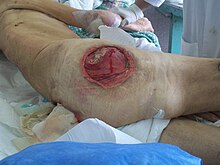Care errors
A care error is an action or failure of a caregiver in the context of professional care that does not correspond to the nursing standard or deviates negatively from the current state of knowledge of nursing science . A care error or a so-called undesirable event can lead to damage (bodily harm, death) to the person being cared for, e. B. decubitus (bedsores) or desiccosis (drying out).
Nursing errors can have structural causes, such as a lack of qualified nursing staff, or they can be traced back to carelessness or poor performance on the part of individual participants.
Maintenance errors caused negligently or deliberately can lead to criminal or civil liability of those responsible. This can affect the person causing the problem or, in the case of organizational negligence , the person responsible for the care organization. The injured person can under certain circumstances demand compensation and compensation for pain and suffering.
But not every adverse event is a care mistake: If the necessary prophylactic measures have to be omitted due to special situations, for example in a life-threatening condition, in palliative patients in the final phase or because the patient capable of giving consent refuses the measures - after information and clarification about possible consequences.
Avoidance of care errors
Avoiding care errors is part of professional care. The patient safety in a facility is increased by a functioning quality management if there is a systematic risk management . Responsibilities should be defined, causes uncovered, possible consequential damage minimized and further errors avoided.
Whether and how this happens is an expression of the error culture in a care facility. The detection of individual misconduct is by no means a matter of course even in the case of care errors. Many errors go undetected and (discovered or undetected) often without consequences. Error reporting and learning systems should make a contribution to learning from errors in order to prevent them in the future.
Reporting and error reporting systems
To support the avoidance of errors, the Kuratorium Deutsche Altershilfe (KDA) had set up an anonymous online reporting and learning system "Learning from critical events" for professional carers and relatives, which is no longer available. It was not a classic error reporting system , but a moderated forum in which solutions to existing problems were to be shown through comments from other users and with the assistance of the KDA.
The Critical Incident Reporting System is not only aimed at elderly care workers, but also at all employees in the healthcare sector .
Adverse events in outpatient care
In outpatient care , unlike in the inpatient sector, the autonomy of the patient and the relatives is significantly higher, so that it is not always ensured that e.g. B. Hygiene requirements or prescribed drug therapies are consistently followed. According to a Canadian study, the triggering factors for adverse events in outpatient care were the employees or the structures of the health system in 39.8%, relatives or informal caregivers in 10.8% and the patients themselves in 35.5%.
See also
literature
- Kuratorium Deutsche Altershilfe (KDA, Ed.): Learning from critical events: A bug reporting and learning system for elderly care. In: Pro Alter - specialist magazine of the Kuratorium Deutsche Altershilfe 1/2007, p. (Network for the detection of care errors)
- Zeitschrift PflegeRecht - magazine for legal questions in inpatient and outpatient care. Luchterhand Verlag at Wolters Kluwer, ISSN 1433-7231
- Legal dispatch for health care - Legal journal for health care
Documentary film
- The sick factory. Patients in need - nurses at the limit. 3sat , 45 minutes, SWR, 2008. (The nursing staff must not make any mistakes when the workload is high. The sick factory shows the drastic conditions in a large German clinic. Nursing at a run. Hospital risk for patients. Everyday ward routine.)
Web links
- Tips for caring relatives Help and suggestions for laypeople of the advertising-free German care information to avoid the most common care errors
Individual evidence
- ↑ Perspektivenwerkstatt patient safety in outpatient care. Final report for the ZQP, November 2018. p. 24 Accessed on November 28, 2019
- ↑ www.cirsmedical.de ; accessed on November 28, 2019
- ↑ Perspektivenwerkstatt patient safety in outpatient care. Final report for the ZQP, November 2018. P. 96 Retrieved on November 28, 2019
